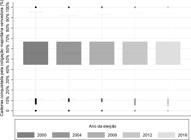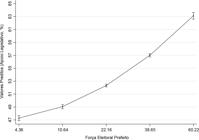ABSTRACT
Although the mayor holds the most important elective office in Brazilian municipalities, his role requires legislative support to implement its agenda. In this article, we analyze some resources that mayoral candidates who have been elected mobilized to obtain the greatest potential for legislative support. We started from two possibilities: either the elected candidate transfers his popularity to his supporters in the proportional dispute; or if he forms a coalition with several parties. The first option is based on the coattail effect; the second, in the following institutional aspects: fragmentation in the Legislative and concentration of candidates in the Executive. Using municipal electoral coalition data, we investigated five elections (2000-2016). Our results suggest that both the popularity transferred by the elected mayor and the number of parties in the majority coalition positively affect the potential for legislative support. Finally, the data indicate that there is no interaction between these two effects, demonstrating that both strategies are unrelated alternatives.
municipal elections; Municipal Legislative; Municipal Executive; Party coalitions; coattail effect

 Thumbnail
Thumbnail
 Thumbnail
Thumbnail
 Thumbnail
Thumbnail
 Thumbnail
Thumbnail
 Thumbnail
Thumbnail
 Thumbnail
Thumbnail
 Thumbnail
Thumbnail
 Thumbnail
Thumbnail
 Fonte: Elaboração dos autores a partir de dados do TSE.
Fonte: Elaboração dos autores a partir de dados do TSE.
 Fonte: Elaboração dos autores a partir de dados do TSE.
Fonte: Elaboração dos autores a partir de dados do TSE.
 Fonte: Elaboração dos autores a partir de dados do TSE.
Fonte: Elaboração dos autores a partir de dados do TSE.
 Fonte: Elaboração dos autores a partir de dados do TSE.
Fonte: Elaboração dos autores a partir de dados do TSE.
 Fonte: Elaboração dos autores a partir de dados do TSE.
Fonte: Elaboração dos autores a partir de dados do TSE.
 Fonte: Elaboração dos autores a partir de dados do TSE.
Fonte: Elaboração dos autores a partir de dados do TSE.
 Fonte: Elaboração dos autores a partir de dados do TSE.
Fonte: Elaboração dos autores a partir de dados do TSE.
 Fonte: Elaboração dos autores a partir de dados do TSE.
Fonte: Elaboração dos autores a partir de dados do TSE.